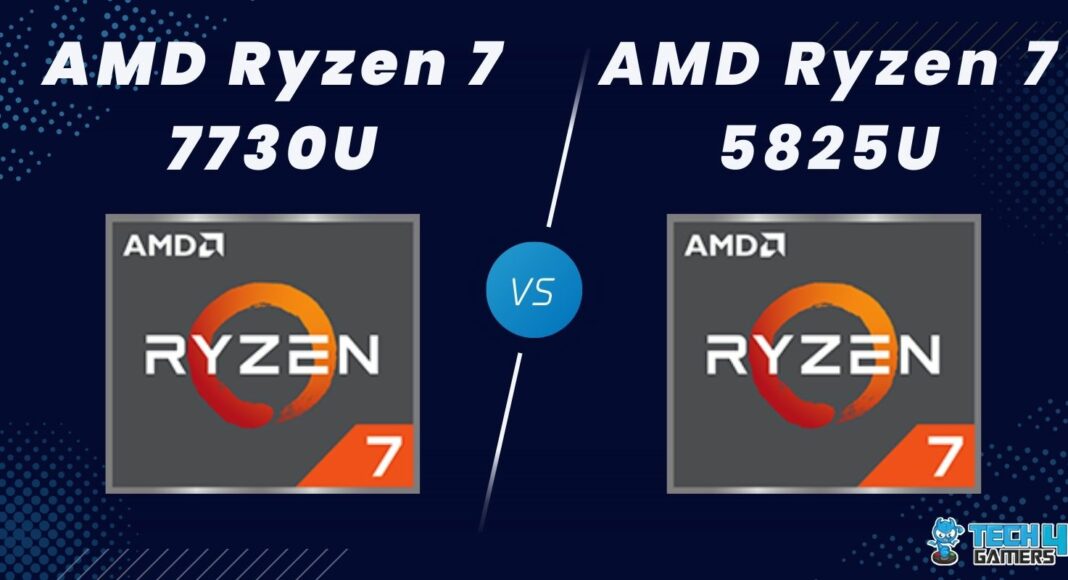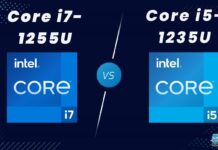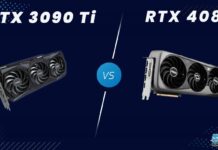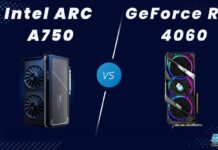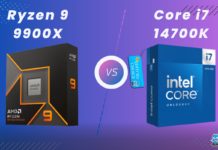AMD Ryzen 7 7730U
Rated: 8/10
AMD Ryzen 7 5825U
Rated: 7/10
Pros And Cons
| CPU | Pros | Cons |
|---|---|---|
| Ryzen 7 7730U | ✅ Higher Gaming Visuals ✅ ECC Memory Support | ❌ No Unlocked Multipliers ❌ High Energy Consumption |
| Ryzen 7 5825U | ✅ Value For Money ✅ Energy Efficient | ❌Low Reliability ❌No Unlocked Multipliers |
- Firstly, the Ryzen 7 7730U demonstrates a marginal edge in both our single-core and multi-core benchmarks by 1.2% and 5.5% on average, respectively, making it a preferred choice for efficient processing in various tasks and multitasking scenarios.
- With superior multi-core scores, the Ryzen 7 7730U proves more adept at handling resource-intensive workloads, making it suitable for demanding computing tasks during our testing.
- In addition, both processors support up to 64GB of – DDR4-3200, – LPDDR4x-4267 memory, ensuring smooth data access and ample bandwidth for memory-intensive applications.
- Users can choose either the Ryzen 7 7730U or the Ryzen 7 5825U based on their specific performance requirements, with the former offering a slight performance advantage and ECC memory support for enhanced error correction capabilities.
Comparison Table
| Key Specifications | Ryzen 7 7730U | Ryzen 7 5825U |
|---|---|---|
| Vendor | AMD | AMD |
| Release Date | January 5, 2023 | January 4, 2022 |
| Device Type | Laptop | Laptop |
| Instruction Set | x86-64 | x86-64 |
| Integrated GPU | Radeon Graphics (Ryzen 7000) | Radeon RX Vega 8 (Ryzen 4000) |
| Total Cores | 8 | 8 |
| Total Threads | 16 | 16 |
| L1 Cache | 64K (per core) | 64K (per core) |
| L2 Cache | 512K (per core) | 512K (per core) |
| Transistors | 10.7 billions | 10.7 billion |
| Socket | FT6 | FP6 |
| GPU Base Clock | 1500 MHz | - |
| GPU Boost Clock | 2000 MHz | 2000 MHz |
| Cuda Cores | 128 | 512 |
| Execution Units | 2 | - |
Architectural Differences
The Ryzen 7 7730U vs Ryzen 7 5825U features are quite similar in terms of specifications, as they share the same 7nm process node. However, subtle differences in their internal architectures can still impact their performance and efficiency. Let’s take a closer look at what these processors have to offer.
- Process Node: Despite sharing the same 7nm process node, the Ryzen 7 7730U and Ryzen 7 5825U embody distinct architectural advancements, contributing to their individual performance characteristics.
- Clock Speed: Moreover, using identical clock speeds, both processors boast a Base Clock of 2.0 GHz and a Boost Clock of 4.5 GHz, promising a seamless computing experience for users.
- Memory Support Variation: Catering to memory-intensive tasks, both the Ryzen 7 7730U and Ryzen 7 5825U support up to 64GB of DDR4-3200 and LPDDR4x-4267 memory, ensuring efficient data access and ample storage.
- TDP: Operating with an energy-efficient 15W TDP, the Ryzen 7 7730U and Ryzen 7 5825U strike a balance between performance and power consumption, making them suitable for various computing needs.
- Supported Technologies: Finally, enabling enhanced error correction capabilities, both the Ryzen 7 7730U and Ryzen 7 5825U support ECC memory, a valuable feature for critical computing tasks that demand exceptional reliability.
Building upon our other comparisons of the Ryzen series, this time, we will be diving into the performance of the Ryzen 7 7730U vs Ryzen 7 5825U. We will be examining these processors based on their specifications, architectural differences, and, finally, performance benchmarking to crown a winner. So, without any further ado, let’s get started!
Ryzen 7 7730U vs Ryzen 7 5825U – Performance Benchmarks
To gain a comprehensive understanding of the Ryzen 7 7730U and Ryzen 7 5825U’s performance, we ran a good range of benchmark tests. By testing their performance in popular benchmarks like Cinebench R23 and Geekbench 5, we were able to uncover how these processors fare in both single-core and multi-core processing tasks.
Cinebench R23 (Single-Core)
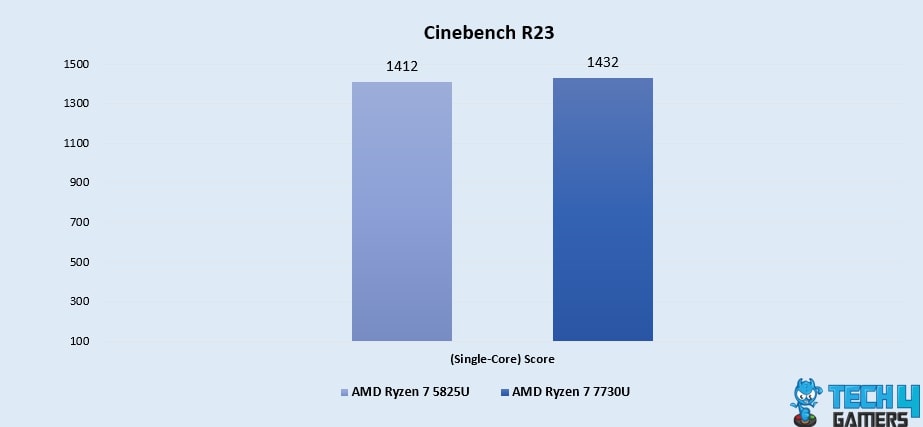
- Starting, we found the Ryzen 7 7730U achieves a score of 1432, showcasing a slight 1% advantage over the Ryzen 7 5825U, which scores 1412, highlighting its efficiency in handling single-core tasks with a minimal performance lead.
Cinebench R23 (Multi-Core)
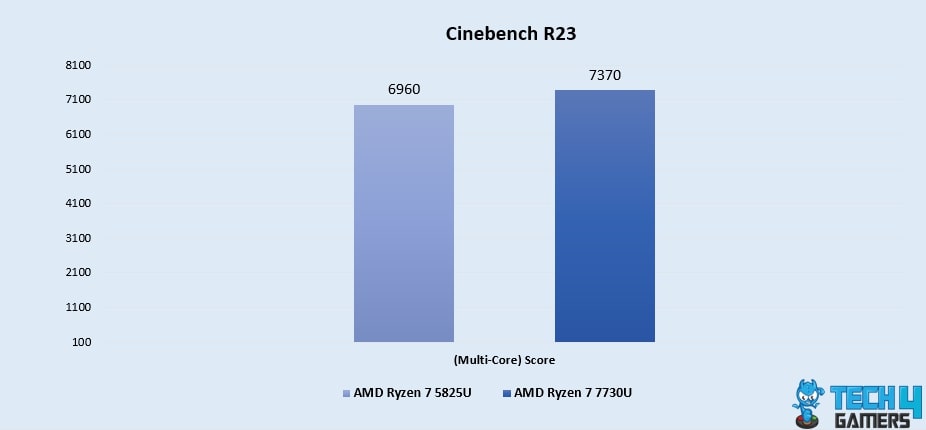
- Moving into multi-core benchmarks, the Ryzen 7 7730U scores an impressive 10215, maintaining a 6% performance increase over the Ryzen 7 5825U during our benchmarking, which scores 9681, making it more adept at handling resource-intensive multitasking scenarios.
Geekbench 5 (Single-Core)
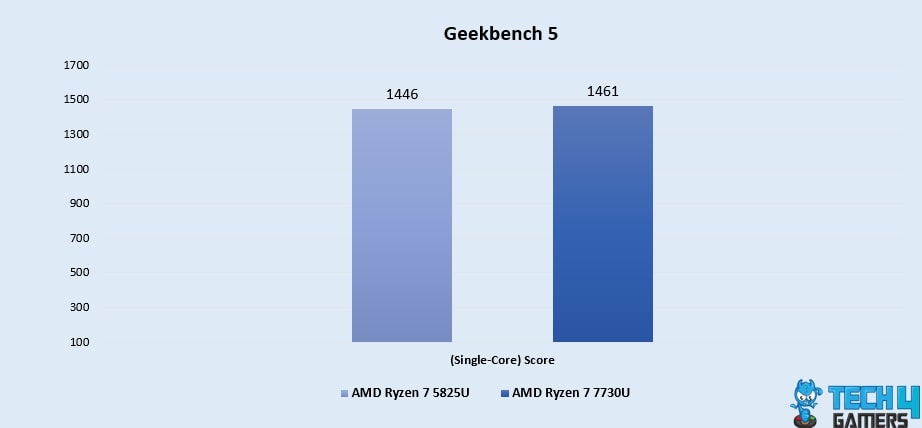
- In single-core tasks, our tests reveal the Ryzen 7 7730U achieves a score of 1461, demonstrating a 1% edge over the Ryzen 7 5825U, which scores 1446, delivering improved processing power for individual applications and tasks.
Geekbench 5 (Multi-Core)
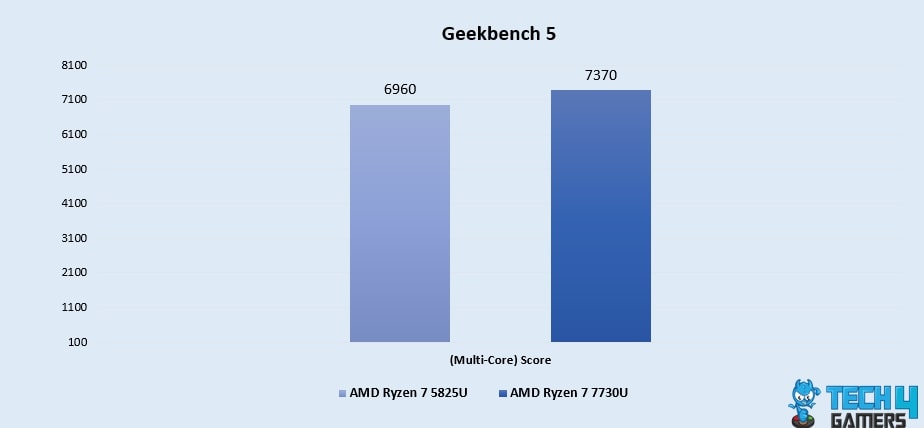
- Transitioning to multi-core tasks, the Ryzen 7 7730U scores 7370, maintaining its superiority with a 6% performance boost over the Ryzen 7 5825U during our tests, which scores 6960, ensuring smoother execution of multi-threaded workloads and demanding computing tasks.
Ryzen 7 5825U Vs Ryzen 7 7730U – Which Chip Will Fit Your Computing Needs
AMD Ryzen 7 7730U: The Ryzen 7 7730U stands out with its exceptional overall performance and better results in benchmarks put to the test by our team. This is coupled with features like ECC memory support which puts the Ryze 7 7730U forward in the competition.
AMD Ryzen 7 5825U: The Ryzen 7 5825U lags when it comes to single-core and multicore performances. Moreover, the processor has lower support for memory and comes with fewer features than the competitor. This loses the credibility of the processor for many users.
We would recommend our readers to consider the Ryzen 7 7730U because of its advantages in both single-core and multi-core performance. With identical memory support and energy efficiency, it offers a versatile solution for a range of computing requirements, making it our recommended pick.
More From Ryzen 7 7730U:
Thank you! Please share your positive feedback. 🔋
How could we improve this post? Please Help us. 😔
[Comparisons Expert]
Shehryar Khan, a seasoned PC hardware expert, brings over three years of extensive experience and a deep passion for the world of technology. With a love for building PCs and a genuine enthusiasm for exploring the latest advancements in components, his expertise shines through his work and dedication towards this field. Currently, Shehryar is rocking a custom loop setup for his built.
Get In Touch: shehryar@tech4gamers.com


